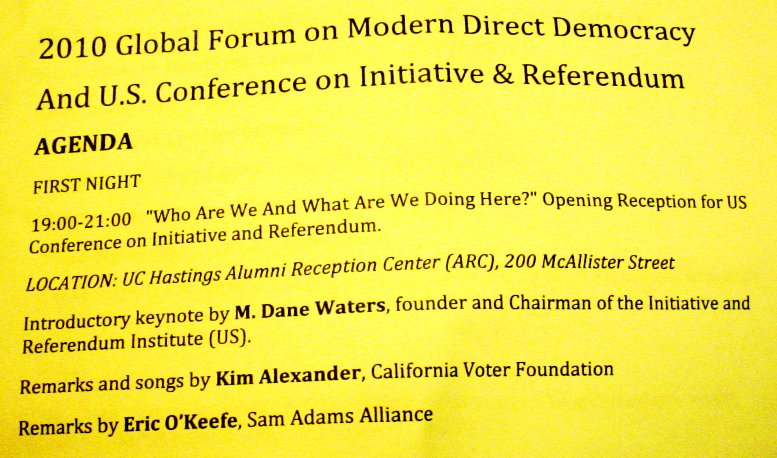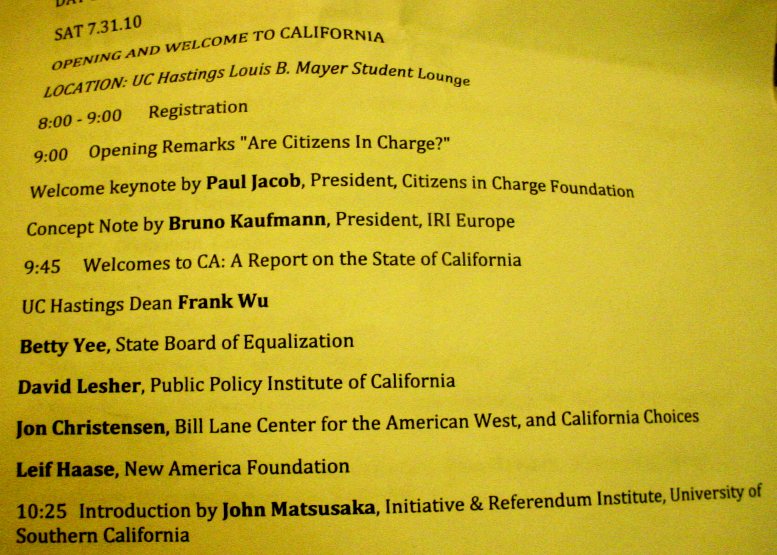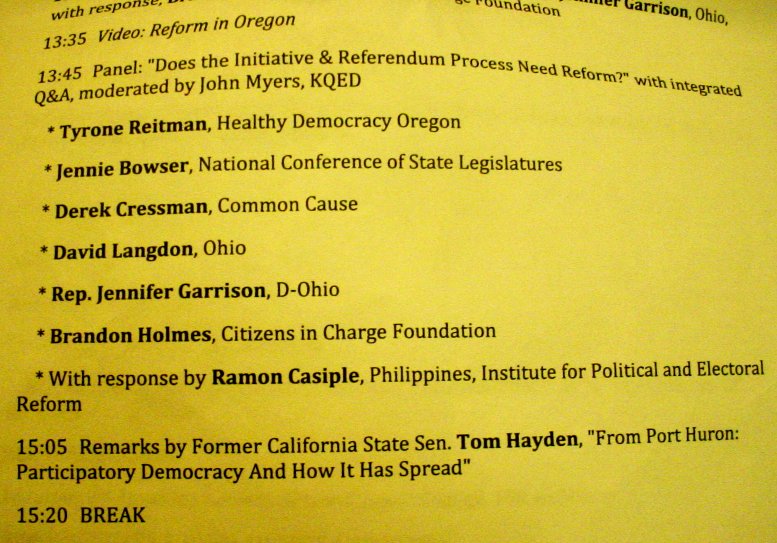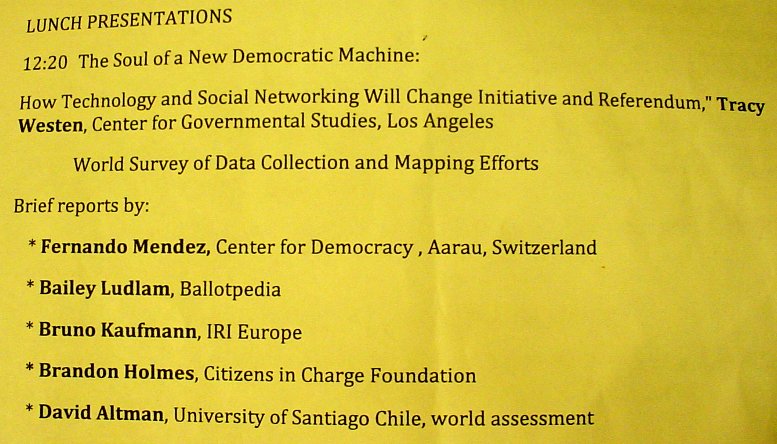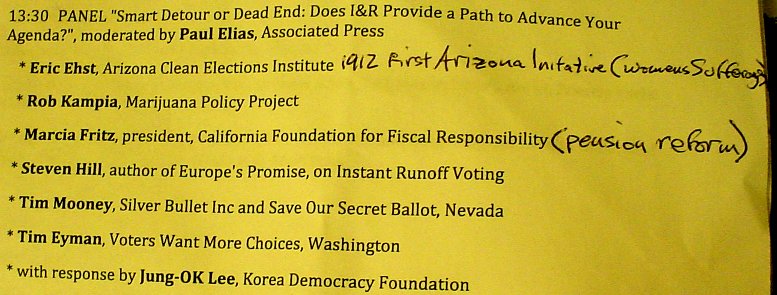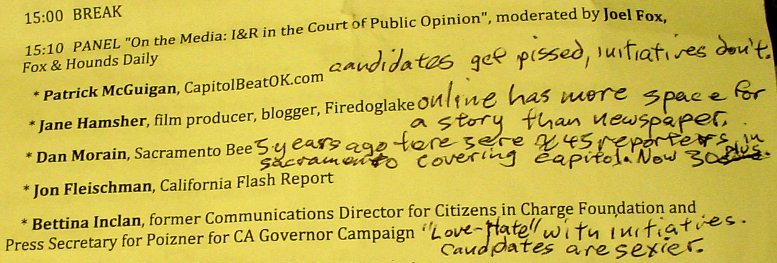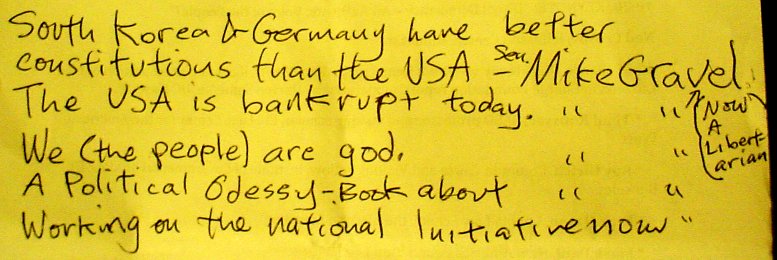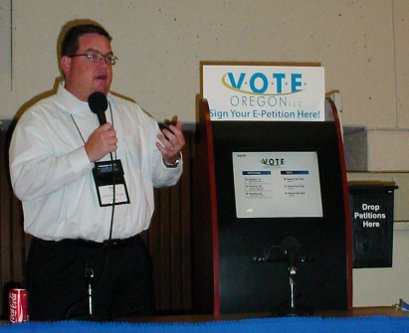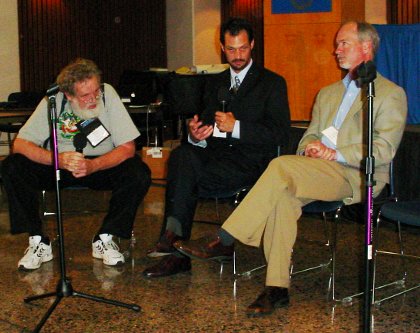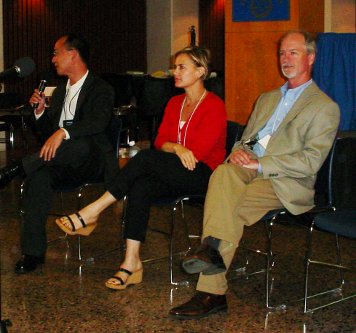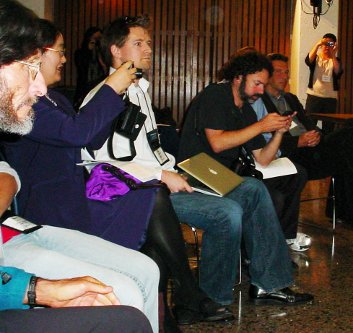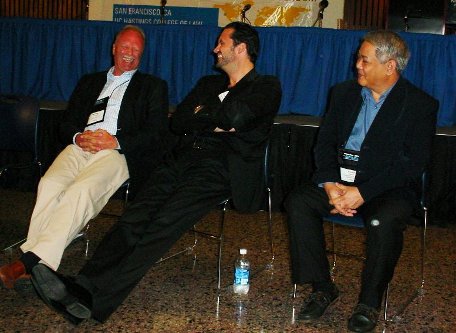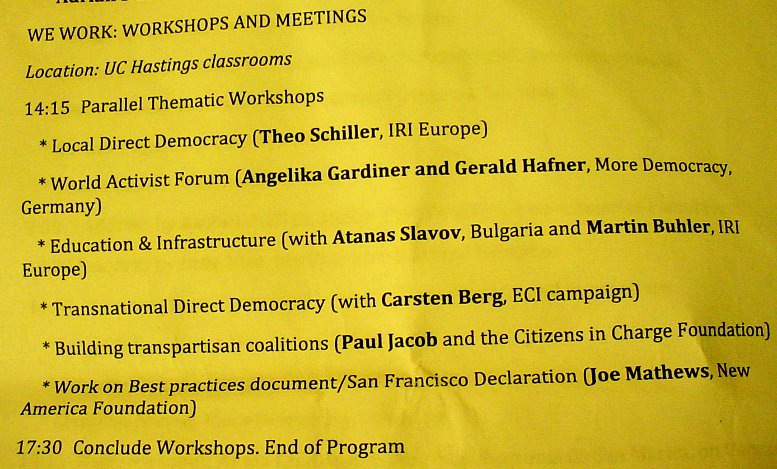Mike Feinstein posted something to the
effect that he was looking for somebody to host an Indian Green during
this Direct Democracy event in San Francisco.
The URL for the event was
in the note, and I visited it. Looked fascinating. There was no charge
to register so I signed up. I missed the first few hours worth of
stuff, but when I got there I quickly found out that it was as good as
I was hoping it could be.
For me one major highlight was Tom
Hayden's talk. He said "democracy has to be part of the fabric of your
life" or words to that effect. They allowed two questions. Somebody
came forward and asked something. Hayden was filling the air with an
answer while I figured out what I wanted to say. I lined up, taking the
other spot.
"In the mid '90s I met and old
Libertarian that was pushing stickers that had VOTE ON NUCLEAR POWER,
with a YES by the on position and a NO by the off position." He
muttered something like "I hadn't heard about that" but I kept going.
"Since then I've expanded the idea, telling people that we need to STOP
VOTING FOR OIL COMPANIES AT THE GAS PUMP. What do you think of that
general idea?
He said that there is a real need for
structure, which my proposal didn't show. Then he said a couple (or was
it a
few?) terms before term limits came along Sacramento had closed down
Rancho Seco, her nuclear power plant. He credited Sacramento's local
utility being a democratic institution with making that possible. The
voters voted SHUT DOWN THE NUCLEAR PLANT in a clear vote, and it
happened. "Before the vote the opponents said the sky would fall, and
guess what?" "The sky is still there."
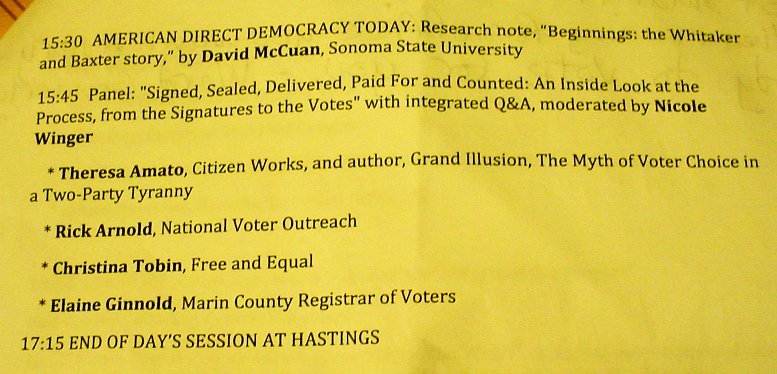
Whitaker and
Baxter were campaign consultants that created (Republican) modern
media
democracy as we experience it here in California today. McCuan pointed
out that they believed their candidates should dominate the field.
Their first state wide victory came against Upton Sinclair and his EPIC
movement in 1932. They used some dirty tricks and smear tactics in
their campaigns.
I didn't hear mention that one of the Assembly Candidates that ran with
Sinclair was Robert A. Heinlein. He responded to the dirty nature of
the experience by going underground, burying his politics in science
fiction that was important to many during the space race. Heinlein is
still widely read and available. His best books amount to a frontal
assault on the pillars of the status quo that supported Whitaker and
Baxter's candidates.
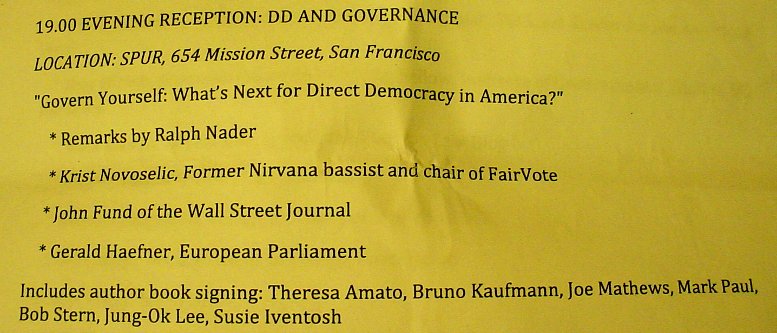
Nader phoned in his participation. He
said such words as "citizenship" and "democracy". What I remember more
about the evening than the speeches was the beer. It was strong and
tasty, with a label that called it "Budgetary Alement - Strong beer for
a weak economy."
Later I found myself talking about how
in this modern digital age, you're not always sure if you're doing all
of the respecting of others privacy that you should. Not only that,
you're not sure your own privacy is being respected. However,
considering that Nader called in to make a speech and took Q&A
afterwards, it seems reasonable to conclude that the whole experience
was on the up and up.
All of the other speakers were there in
the flesh. They hung around to talk to people at the end to. The tone
of the event was very much "lets figure out how we can work together."
The book signings weren't in the same place, so I missed that part of
it.
The public defender is doing a local
initiative
campaign in the City and County of San Francisco. He expects to fully
inform the voters and win in the end. At the time he spoke the
initiative had not yet qualified for the ballot, although he had
submitted what he thought were enough signatures. Since then they have
proved good. See
SFSmartReform.com
for more information.
There was some mention of the fact that
big money has figured out enough about how to game the system enough
that they win often enough.
I think this was the panel that I asked
something like "Back in 1994 there was an initiative on the ballot in
California for a nickel a gallon gas that lost by a lot. Since then
nobody has tried to do that kind of thing here. Also, the oil, car, and
tire lobbies have so outbid the rest of us for incumbent seats that
getting elected with another agenda is not an option. What other
approaches to the system are available in that situation? One of the
speakers said something like "educate the public." The others might
have said something, but I don't remember what.
Two Presidents, two attitudes about
initiatives.
I was shocked and alarmed to find out
that Sacramento has so few reporters now. There were many more in the
early '90s when I lived there. Back then they were already so thin that
it seemed like the only way to get a story in the Bee was to get a wire
service reporter to cover it and then ask the paper's editor to get it
off the news feed. The days when they could be counted on to send a
reporter to anything were long gone.
I'm in favor of this initiative. My
memory of the speech is clouded by that. Visit
TaxCannabis.org for more info.
They introduced Senator Gravel
(pronounced Gra-Vell) as the guy that
tag teamed with Fulbright to bring down the Viet Nam War. He's still a
good speaker.
Yup. I really heard him say that the
USA is bankrupt.


That reception was a remarkable event.
For one thing, the food was VERY GOOD! For another the Swiss were
putting their best foot forward. The Ambassador was introduced as
having come to California after representing his government in Iraq. He
spoke for a few minutes, saying that Switzerland is very in favor of
direct democracy, and is a remarkable world power despite being a small
country with not much in the way of natural resources. He didn't
exactly say that, he just quoted statistics like "fifth largest banking
country on the planet."
There was an Nth generation Swiss-Californian from Sacramento who gave
a brief talk. She explained that her (Great-Great?) Grandfather had
come to California from (she held up a card with a Swiss looking name
she never said neatly printed in block capital letters on it) back in
the days when democracy came from the
barrel of a gun. He built himself a nice ranch, but later he sold the
land to California and our State Capitol now sits there.
After that there were a few more talks by other conference
participants. Things like a few words from an Indian Green that comes
from a province there with 4.2 million residents "small by our
standards." I heard that and I thought "that's as big as our biggest
County, Los Angeles."

Grover Norquist is a name I've heard
many times. I think of him as a total Republican. He said a few things
that shocked me so much I didn't write them down. Stuff like "The Bush
Administration had one story about what was going on for the general
public, and something completely different for a much smaller inner
circle." The comment I did note below was there more to illustrate that
sometimes the State doesn't give people it doesn't like much choice.
He also talked about what politics
feels like in Washington sometimes. "Every member of Congress has their
agenda, and that is cast in stone. Sometimes even for years after that
member dies." I gather developing policy has some chess game aspects
there.
Brulte characterized California as
"generally sleepy and easy to get along with, but when they really
don't like something they let you know, and sometimes they do something
big because of it."
Hafner has been an elected Green in
Germany's Bundestag and in Brussels.
Gross said something like "political
power can be like light, or it can be like Machiavelli's Prince." He
used the names of philosophers like they were everyday words that bring
to mind specific images and tendencies.
This was another panel where I asked a question. It went something like
this "Is there a role for the laws of physics in this stuff? I remember
talking to a guy that told me he worked on the physics for the high
efficiency LED bulbs that are currently taking over from the LPF
fluorescents. Those guys are changing the way we see things in a real
way. On another occasion I asked a New Zealander if she'd heard of
Kirchoff's laws, which are key to understanding the way electricity
flows in circuits. She said she'd never heard of them. I know it's not
reasonable to expect everybody to have heard of that, but still. What's
the role of the laws of physics?" Brulte and Hafner ducked the
question. Gross said only "there is a role for the laws of physics."



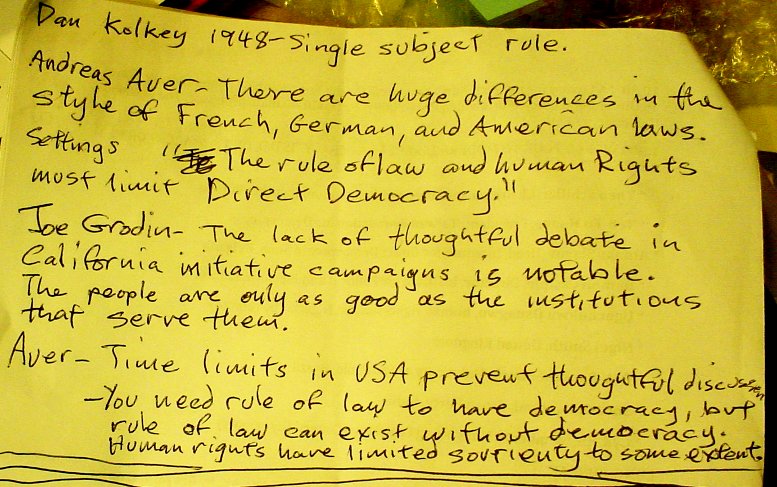
The single subject rule says that any
initiative submitted to the voters must just be about one thing.
Ross Day showed off his participatory
democracy robot, "Petey". It has a touch screen that lets you go
through the list of petitions currently circulating. If you want to
sign one it prints a coupon for you to sign. Then you can put that in
the mailbox on Petey's side.
Darcy Goddard got an award for her
work. She was the only one they honored that way.
We talked about many things. The format
was
called a "park bench." They had a half dozen panelists and an empty
chair up front at the beginning of the session. The guy explained that
if you felt you needed to say something, come up and sit in the empty
chair. If the chairs are all full and you're done speaking, vacate and
make space for someone else.
Somebody from Stanford said "voting on
referendums is likely to be used
more in private contexts than public ones in the near term future."
I took a turn to say that "people with
common names have a very
different relationship with their names than people with unusual
names." I think I also mentioned that "There is only one Barak Obama in
the USA, and the name of the President is a public utility." That
contrasts with George Bush, which is in many phone books, and not just
on the page where they list the elected officials.
Somebody else talked about Code for America, a group getting fresh
college graduates to spend a year getting some small town's information
online as a volunteer project.
By this time it was getting late and
the crowd was down to maybe thirty people or so. Still an interesting
time.
I got there about when Art Torres said
"tell you legislators what you want, they are your employees."
Weinberg said that California's stem
cell research was more of a political reaction to Bush's stopping of
federal research than a good idea. She didn't think we should do that
again.
Triga had gathered some statistics
about how initiatives got on the ballot (some by initiative, some by
executive decree) and how many won in each category.
The Humane Society has good luck with
initiatives. They have gotten them on the ballot in many States (around
22 recently) in the USA, and a lot of them have passed. The most recent
one in California was Prop. 2 the one about humane farm conditions.
They created the laws against dog fighting that got Michael Vick, among
others. I think they leverage the fact that people find it easy to
identify with animals.
After that I left. They were looking
for collective solutions involving ballot boxes and so forth. The whole
thing just wasn't set up to work for solutions like "voting your
dollars is a political act." Since then I've been wondering what that
would look like. Maybe international standards for meanings of such
terms as "world famous" and "okay".
Movies are quite regulated. They are
seen widely compared to most opinions. Traffic signals have some of
that to.
Sorry, I can't tell you what the future
of direct democracy looks like. I was long gone before it happened.
I brought home quite a pile of
authoritative looking books. I'm planning to give them to the San Jose
Peace Center after looking over them a bit. If you're local and
curious, look for them there.
